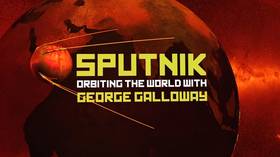In a week when oil became cheaper than water, when the downturn in employment became the fastest in human history, and when a developing country appeared to be a safer haven than a so-called developed one, we look at the economics of the coronavirus and what the world might look like when we emerge from the pandemic. Economics Professor Steve Keen is a familiar face on Sputnik, so he was beamed into the studio from his home in Thailand in order for us to ask whether we’re now witnessing the end of capitalism as we know it.
And Covid-19 in the month of Ramadan. With pilgrimages to Mecca canceled, gatherings at mosques curtailed, and strict curfews in place, the traditions and rituals of Ramadan are set to be very different this year. But what of the political and economic ramifications of a pandemic in the Arab world during this time? Armed fighting persists in the region and the Israeli government’s intention to annex parts of the occupied West Bank has the potential to destabilize treaties with its neighbors. Jordan, Egypt and Saudi Arabia are all facing social unrest as a result of the economic collapse, so we spoke with David Hearst, editor-in-chief of the Middle East Eye, to find out just what is happening in the region.
